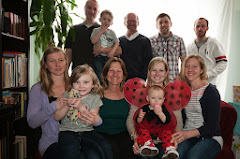I
changed my training regiment in mid-October. I slowed down my longer runs in
order to avoid injury, but increased my speed work to up my speed. It hasn’t
worked. In three months I’ve injured myself more times than I have in the
previous three years. I’m not sure what I’ll do but I’m nursing another
hamstring injury and can’t start to train in earnest for the Boston Marathon.
Late October I ran 8 miles at 6:30/mile pace. Figured that would put me
sub-three hours in a marathon pretty easy if by late February I could run 16
miles at at 6:30 pace. That ain’t happening. Not sure what to do but I’m going
to have to change something. Those races are expensive and to waste the money
by hurting myself—something I seem to have a penchant to do—is unwise.
Thursday, January 23, 2014
Tuesday, January 21, 2014
Welcome Adeline (Sweet Adeline)
 Remember
that old barber shop quartet song, “Sweet Adeline, my Adeline?” My oldest
daughter had baby number two the other day. Adeline (Addy for short) means noble. She’s noble alright! Six pounds and eleven ounces of nobility and
lots of brown hair. She’s a milk guzzling machine. I’m thrilled. But I
wondered, “Uh, what’s with the brown hair? Every other kid or grand kid around
here is or was pretty much blonde. What’s up?” I got no answer.
Remember
that old barber shop quartet song, “Sweet Adeline, my Adeline?” My oldest
daughter had baby number two the other day. Adeline (Addy for short) means noble. She’s noble alright! Six pounds and eleven ounces of nobility and
lots of brown hair. She’s a milk guzzling machine. I’m thrilled. But I
wondered, “Uh, what’s with the brown hair? Every other kid or grand kid around
here is or was pretty much blonde. What’s up?” I got no answer.
Laurel ended up in the
hospital with endometriosis. But she got better by God's grace and modern medicine. One hundred-fifty years ago she would have probably died. Here's a picture of Addy (Adeline). It's all good!
Check
out this 1939 vintage barber shop quartet singing Sweet Adeline:http://www.youtube.com/watch?v=zz8yNa4uZN0
Check out this more recent version of the same song with an explanation of its history. Pretty interesting: http://www.youtube.com/watch?v=igehsfyKVtQ
It’s (not) better to be European
We
had a tile guy come in to our house the other day. After 10 years, we were finally
putting up our back splash in the kitchen. It was one of my sabbatical projects
along with making sure we had a generator wired directly into our house so the
next time Hurricane Sandy (or a black out or a brown out or anything else, for
that matter) shuts out our electricity, we’ll be all set. At any rate, the tile
guy comes and he’s named German. But he’s not German, he’s from South America.
I
said, “Wow, that’s an interesting name. German! Sounds very European.” To which
he responded, “Well, yes but unfortunately, I’m not.” That took me back.
Because the tone of voice, the way it was said, etc. all communicated, “I wish
I was white and European. But I’m not white or European even though I have a
white European name.” It bothered me. I asked about his ethnicity. He was from
Ecuador. I said, “You have a wonderful culture.” He nodded, smiled, and agreed
with me, then we talked about tile. I was going to lean into him a bit but it
would have been inappropriate.
Who
knows exactly what it meant? But it took me back. What are the standards for
beauty, privilege, and success, even in today’s American culture? White,
blonde, blue eyed, and western? I am white. I’ve been white my whole life. I
like white people. (I once said that in front of a white congregation in Maine
and they thought it was a racist statement—from a white guy! Go figure.) But
white isn’t right and the west isn’t always best. Caucasians have made a
wonderful imprint on the culture of the world. Our culture, and the many
varieties it contains, will be represented in heaven (Rev 7:9-11). But we have
a lot to repent of as well. The same white skin that made so many wonderful
scientific discoveries and gave us Bach and Mozart in the 18th
century also raped the Belgian Congo in the 19th century (Read the
book King Leupold’s Ghost for a
nauseating study of that), and started a good chunk of World War II in the 20th
century.
I believe
each cultural group has wonderful redemptive gifts that it brings by divine
design to the world community. But each cultural group as well, must come to
grips with the reality that sin has tainted those gifts and they must come to
grips with that, for true cultural healing to take place. Speaking about the
Germans, consider my post on my trip to Berlin to see what cultural repentance
may look like—even for a culture or government that’s not distinctly religious (See
January 2012—Post entitled The Topography of Terror).
Subscribe to:
Posts (Atom)


